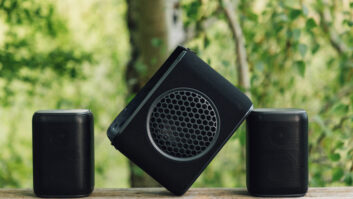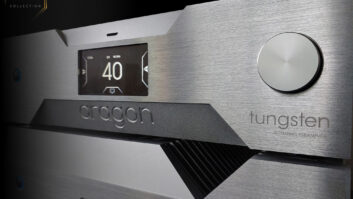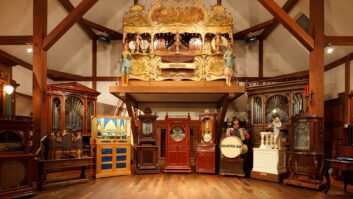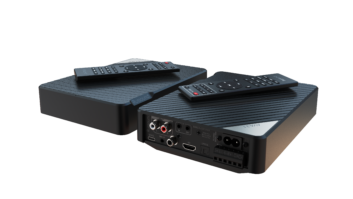Two start-up companies are divorcing streaming Internet audio content from the PC to simplify access to Internet radio stations, which number in the thousands.
AudioRamp.com of Tustin, Calif., and Kerbango of Cupertino, Calif., have developed tabletop Internet radios that feature built-in 56K modems and software that accesses streaming audio websites. AudioRamp’s products also download and store music files from the web without the assistance of a PC.
When connected to a PC, the products deliver additional features.
Founded last year by former AST Computer executives, AudioRamp has developed the tabletop iRad-S AM/FM/CD radio and the iRad-C, an audio-component-style Internet-audio tuner that can be plugged into an A/V system. The component lacks AM/FM tuner, CD player and amplification.
Both AudioRamp products are due in April at $399 through the company’s website and other as-yet undisclosed sites. Within six months, the company wants to sell the devices through a national retail chain, a spokesman said.
Both AudioRamp products play back streaming audio in the Microsoft Media Player and Real Networks formats. They also download and store music files in the MP3, Microsoft Windows Media Audio (WMA) and Real Networks formats. Music is stored on a hard drive with about 4-5GB of storage.
The devices use Intertrust’s Metatrust digital rights management technology to download paid-for music files.
The tabletop model’s built-in CD player plays standard CDs as well as CDs encoded with MP3, WMA and Real Networks files. It does not rip CDs, however.
Through an Ethernet or Home PNA (phone-wire) LAN connection to a PC, both models will take advantage of a cable-modem or DSL modem to speed up download times and improve the audio quality of streaming content. The devices can also be linked to broadband modems without using a PC.
For its part, start-up Kerbango last fall launched its web-based Kerbango Tuning Service (KTS), which helps PC users find and listen to more than 4,000 streaming audio sites that use Real Network streaming codecs.
By April, the company will launch an AM/FM/KTS tabletop clock radio that accesses the site without the use of a PC. Unlike AudioRamp’s products, the Kerbango clock radio doesn’t store downloaded files.
Kerbango wants to license its technology to consumer electronics manufacturers for use in a variety of audio products “to make Internet tuning as ubiquitous as AM/FM,” said marketing VP Marc Auerbach.
“We’ll have an announcement soon on a large partner,” he claimed. Nonetheless, if marketing agreements with CE suppliers haven’t been completed by April, Kerbango is prepared on its own to market the clock radio product through its website. The price would be less than $300.
Likening the product to a “dedicated browser for our service,” Auerbach said that through the KTS site, the device delivers access to 4,000 sites that use Real Networks technology.
The sites have been screened for technical quality and reliability, not for content, he noted. Kerbango also monitors the streaming sites continually to determine whether their URLs have changed and whether they’re still operating. Updates are automatically uploaded to a Kerbango device whenever the device logs onto the KTS site.
All told, Kerbango has identified 6,000 streaming audio sites that use Real Networks or other streaming codecs such as Windows Media Player and Liquid Audio, Auerbach said. In the future, Kerbango could opt to automatically upload additional decoders to Kerbango devices.
Through a quarter-VGA grayscale display and tuning knobs, the clock radio lets users scroll through top-level audio content categories such as music, news, sports and weather. From there, users click on subcategories such as music genres, then click onto sites within those genres.
Users won’t be able to type in URLs to access individual sites, Auerbach said, in order to make the experience as simple as using a traditional radio.
The LCD screen will also display a “signal-strength” meter to indicate reception quality before streaming begins.
If connected to a PC via an Ethernet or Home PNA LAN, the clock radio will be able to “tune” into MP3 and Real Network files stored on a PC’s hard drive and play them back in real time.
Similarly, Kerbango plans to work with mp3.com and myplay.com to enable the clock radio to access and play back consumers’ MP3 files stored on those sites’ servers, Auerbach said.
To improve the sound quality of streaming audio programs, users can take advantage of a PC’s cable or DSL modem through an Ethernet or Home PNA connection to the PC. The device will also connect to some DSL modems without going through a PC. With a 56K modem, the clock radio delivers up-to-FM stereo quality, but with a broadband connection, CD quality is possible, Auerbach said.
The product incorporates full-range speakers and a 2-watt per channel amplifier, but for improved audio quality, it features a line-level output that connects to more elaborate audio systems.
The company, whose founders are former Apple and Power Computing executives, sees its revenue deriving from licensing, selling “dial positions” to streaming sites, and running ads during the buffer period that occurs after a site is accessed.













